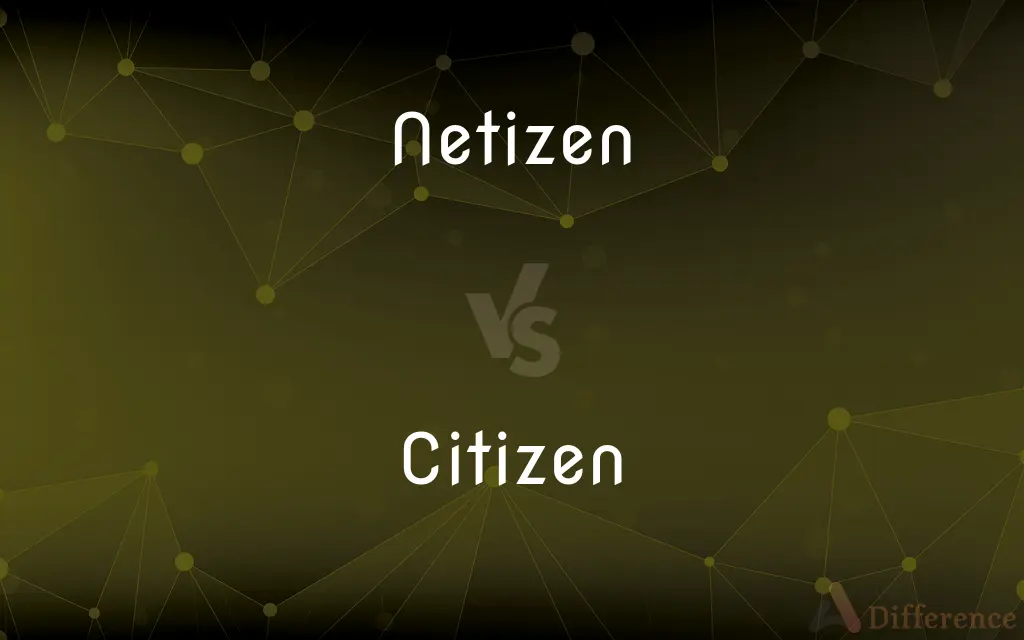Netizen vs. Citizen — What's the Difference?
By Tayyaba Rehman & Urooj Arif — Updated on March 29, 2024
A netizen is an individual who actively participates in online communities, while a citizen is a legal member of a country, entitled to its rights and subject to its laws.

Difference Between Netizen and Citizen
Table of Contents
ADVERTISEMENT
Key Differences
Netizen refers to a person who is actively involved in the online world, particularly within internet communities, social media, and other digital platforms. This term emphasizes participation, contribution, and engagement in the virtual space. On the other hand, a citizen is someone who legally belongs to a specific nation or country, with entitlements to its protections, rights, and obligations, including obeying its laws and possibly participating in civic duties such as voting.
The concept of a netizen is rooted in the digital age, highlighting the role of individuals in shaping online culture, discourse, and community. Netizens can influence public opinion, contribute to the spread of information, and participate in global discussions, regardless of their physical location or national identity. Conversely, citizenship is a legal status that connects an individual to a specific nation, often by birth, naturalization, or descent, encompassing rights such as voting, work, and residence, along with responsibilities like taxation and jury duty.
While the identity of a netizen is defined by virtual activity and presence, citizenship is determined by legal and geopolitical boundaries. Netizenship transcends geographical borders, allowing for a global community where ideas and information flow freely. However, citizenship is bound by the territorial and legal confines of a state or country, with its rights and duties often limited to the physical borders of that nation.
The rise of digital communities and the internet has expanded the concept of identity and belonging, introducing the idea of netizenship as a form of virtual community membership. This contrasts with traditional citizenship, which is typically acquired through legal means and is associated with a specific geographical location and its governing laws.
Netizens and citizens both contribute to their respective communities, but their realms of influence and the rules that govern their participation differ significantly. Netizens engage with a global audience, contributing to the digital landscape, while citizens' rights and responsibilities are tied to their country's laws and civic structures.
ADVERTISEMENT
Comparison Chart
Definition
An individual active in online communities.
A legal member of a country.
Basis of Identity
Participation in the digital world.
Legal status within a nation.
Scope
Global, transcending physical boundaries.
National, within a country's territorial limits.
Rights and Duties
Governed by the norms of online platforms.
Defined by the laws and regulations of a country.
Community
Digital and virtual communities.
The physical community of a nation or state.
Compare with Definitions
Netizen
Can influence public opinion through social media.
Netizens played a key role in spreading awareness about climate change.
Citizen
Identified by nationality, often through birth or naturalization.
She became a citizen of her adopted country after five years of residency.
Netizen
Belongs to global online communities.
Netizens contribute to international crowdfunding campaigns.
Citizen
Subject to the laws and taxes of their country.
Citizens pay taxes to support public services.
Netizen
Engages actively in online discussions and communities.
A netizen might moderate a popular forum.
Citizen
Involved in civic duties and responsibilities.
Citizens serve on juries as part of their civic duties.
Netizen
Defined by online presence and activity.
A well-known blogger is recognized as an influential netizen.
Citizen
Rights and responsibilities are nation-specific.
A citizen's right to work is typically limited to their own country without special permits.
Netizen
Adheres to the community guidelines of online platforms.
Netizens report inappropriate content to maintain a safe online environment.
Citizen
A legally recognized subject or national of a state or commonwealth, either native or naturalized
A British citizen
Netizen
The term netizen is a portmanteau of the English words internet and citizen, as in a "citizen of the net" or "net citizen". It describes a person actively involved in online communities or the Internet in general.The term commonly also implies an interest and active engagement in improving the internet, making it an intellectual and a social resource, or its surrounding political structures, especially in regard to open access, net neutrality and free speech.
Citizen
A person owing loyalty to and entitled by birth or naturalization to the protection of a state or nation.
Netizen
A person who is a frequent or habitual user of the internet.
Citizen
A resident of a city or town, especially one entitled to vote and enjoy other privileges there.
Netizen
(internet) A member of the community of Internet users.
Citizen
A civilian.
Citizen
A native, inhabitant, or denizen of a particular place
Citizens of rural Utah.
Citizen
A resident of a city or town, especially one with legally-recognized rights or duties.
Citizen
A legally-recognized member of a state, with associated rights and obligations; a person considered in terms of this role.
I am a Roman citizen.
Citizen
An inhabitant or occupant: a member of any place.
Diogenes reckoned himself a citizen of the world.
Citizen
(Christianity) A resident of the heavenly city or later of the kingdom of God: a Christian; a good Christian.
Citizen
A civilian, as opposed to a police officer, soldier, or member of some other specialized (usually state) group.
Citizen
(obsolete) An ordinary person, as opposed to nobles and landed gentry on one side and peasants, craftsmen, and laborers on the other.
Citizen
A term of address among French citizens during the French Revolution or towards its supporters elsewhere; dated a term of address among socialists and communists.
Citizen
(computing) An object.
Citizen
One who enjoys the freedom and privileges of a city; a freeman of a city, as distinguished from a foreigner, or one not entitled to its franchises.
That large body of the working men who were not counted as citizens and had not so much as a vote to serve as an anodyne to their stomachs.
Citizen
An inhabitant of a city; a townsman.
Citizen
One who is domiciled in a country, and who is a citizen, though neither native nor naturalized, in such a sense that he takes his legal status from such country.
Citizen
Having the condition or qualities of a citizen, or of citizens; as, a citizen soldiery.
Citizen
Of or pertaining to the inhabitants of a city; characteristic of citizens; effeminate; luxurious.
I am not well,But not so citizen a wanton asTo seem to die ere sick.
Citizen
A native or naturalized member of a state or other political community
Citizen
Holds specific rights and responsibilities within a country.
Citizens have the right to vote in national elections.
Common Curiosities
Do netizens have rights like citizens do?
Netizens have rights based on the terms of service of online platforms, which differ from the legal rights citizens have within their countries.
Can netizenship replace citizenship?
No, netizenship cannot replace citizenship as they serve different purposes; citizenship is a legal status with rights and duties in a nation, while netizenship involves participation in the digital world.
How does one become a netizen?
Becoming a netizen involves actively participating in online communities or platforms, which does not require any formal legal process.
What responsibilities do netizens have?
Netizens are responsible for following the rules and guidelines of online platforms, respecting others' opinions, and contributing positively to digital communities.
How does citizenship impact an individual's rights online?
While online rights are generally global, certain countries may impose restrictions on internet access and online speech, affecting how their citizens can act online.
Can a netizen's activity affect their legal status as a citizen?
In some cases, online activities can have legal implications (e.g., breaking laws online), but netizenship itself does not alter one's legal citizenship status.
Is the concept of netizenship becoming more important?
Yes, as digital communication and communities continue to grow, the role and influence of netizens are becoming increasingly significant in shaping public opinion and social movements.
Can someone be both a netizen and a citizen?
Yes, individuals can simultaneously be netizens through their online activities and citizens of a country through legal status.
Do countries recognize netizenship?
While countries recognize the importance of the digital space, netizenship as a legal status is not officially recognized; it's more of a cultural and social identity.
How do netizens influence global events?
Netizens can influence global events through awareness campaigns, mobilizing support for causes, and influencing public opinion on a wide scale via social media and other online platforms.
Share Your Discovery

Previous Comparison
Gymnasium vs. Gymnatorium
Next Comparison
Epidemiologic vs. EpidemiologicalAuthor Spotlight
Written by
Tayyaba RehmanTayyaba Rehman is a distinguished writer, currently serving as a primary contributor to askdifference.com. As a researcher in semantics and etymology, Tayyaba's passion for the complexity of languages and their distinctions has found a perfect home on the platform. Tayyaba delves into the intricacies of language, distinguishing between commonly confused words and phrases, thereby providing clarity for readers worldwide.
Co-written by
Urooj ArifUrooj is a skilled content writer at Ask Difference, known for her exceptional ability to simplify complex topics into engaging and informative content. With a passion for research and a flair for clear, concise writing, she consistently delivers articles that resonate with our diverse audience.














































